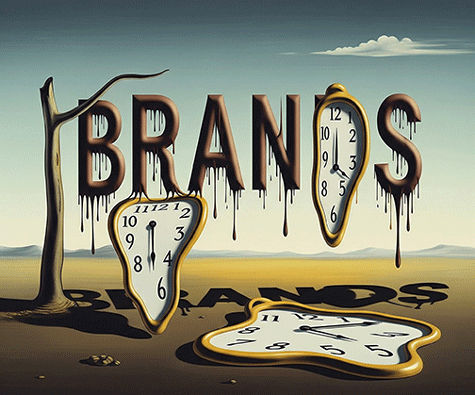The precipitous decline of brands
The precipitous decline of brands
…and the rise of generics because of AI agents and other things.
By Brad Berens
In a recent piece, I mentioned a wide-ranging conversation about AI with my friend Louis Jones of the Brand Safety Institute. Louis and I spent a chunk of time talking about the rise of AI Agents, how they will impact customer behavior, and the implications of those changes for brands. This issue, I’m going to dig a little deeper into that topic.

I created this image using Google Gemini*
If you have never heard about AI Agents, then you might want to take a quick look at this piece.
For those unwilling to click, a short explanation of AI Agents…
In the future people will have teams of AI Agents that make ChatGPT, Siri, Alexa, and their ilk seem like sock puppets. Today’s digital assistants provide us with information. Agents will be able to do things in the world.
Today, Fandango tells me where I can see Superman and allows me to buy tickets. Soon, my AI Agents will look at my calendar, talk with the agents of the people I’m seeing the movie with, look at their calendars, choose a showing at a theater convenient to all, choose the seats, buy the tickets, send the tickets to my phone, set up a reminder about when to leave, and have my popcorn ready to pick up when I reach the theater.
This will be a massive change to shopping and purchasing behavior. Here’s why…
Most of our decisions are unimportant.
The overwhelming majority of our everyday decisions are trivial—what detergent to use, what socks to wear, which cereal to have for breakfast, which route to take to get to work.
Brands like Tide, Bombas, and Count Chocula exist to make it easier for people to make unimportant decisions. Sometimes we are loyal to a brand because we believe the product is better, higher quality, or because the brand says something to the world about us. Most of the time, though, it’s just habit.
The marketing team at Red Bull targets boys aged 15 to 19 as their “entry point consumer” because they believe that by age 20 a young man will have made his energy drink choice for the rest of his life—habit.
Once a brand homesteads a place in your brain, particularly but not only with low-consideration purchases like CPG products, it is unlikely that you’ll buy a different brand unless your typical brand is unavailable when you need, for example, toothpaste. Extrinsic events can shift brand habits, but it takes a mighty big stimulus or a provocative advertisement to wedge the challenger brand into your mind. (The slightly crazy way I shifted from Crest to Colgate is an example.)
Unimportant decisions are a cognitive burden.
In his remarkable book, The Organized Mind, Daniel J. Levitin observes that “the decision-making network in our brain doesn’t prioritize” (page 6). We greet each day with a limited amount of decision-making energy. If we spend that decision-making energy on socks, social media, and shopping on Amazon, then we’ve squandered it and will thereafter make poor-quality decisions.
People want help preserving their decision-making energy.
In a famous 2008 talk, Clay Shirky distinguished between information overload and “filter failure,” arguing that the problem we have navigating evermore information isn’t the fault of the information: it’s our lack of adequate filters to manage that information
A few paragraphs back, I mentioned “which route to take to get to work” among the trivial decisions we make. Often, I use the GPS in my car to navigate places even when I know where I’m going. Partially, this is because my GPS takes traffic into account, but it’s also because I want to think about other things. In Shirky’s lingo, I’m using my GPS as a filter.
AI Agents will become our main filters, and this is bad for brands.
We will offload as many of our trivial decisions as we can to our AI Agents.
Unlike human brains, colorful packaging, celebrity spokespeople, jingles, logos, and slogans have no effect on AI Agents.
The hockey-stick rise of generic products.
If you’re like me, then—when you need something from the pharmacy and see a store brand next to the national brand—you stand in the aisle scrutinizing the back of each box of, say, allergy medicine. Claritin is the national brand of loratadine; the CVS generic reads “Allergy Relief.” If the ingredients are the same on each box, then you’re likely to buy the generic.
I don’t bother doing this with toothpaste or detergent because there are too darned many ingredients for me to make the comparison. I don’t have the cognitive energy, but AI does.
I tend to buy Ticonderoga pencils and Sharpie highlighters, but that’s just because I’m too lazy to make a comparison. If my AI Agent sees that there’s no difference between the national brand and the generic, it will order the generic.
Often, the brand name manufacturer of a product is also the manufacturer of the generic store brand, so there may be no difference between the products. Big brands and retailers alike work hard to keep this a secret. However, if the ingredients are listed, then it’s likely that AI Agents will be able to determine this, which is good for the customer but bad for a national brand that will sell less of the more profitable branded versions.
Is there any hope for brands?
Maybe. One reason why the media rights for sports have stratospheric price tags these days, and the reason why Amazon, AppleTV+, YouTube and others are vying for them, is that sports fan tend to watch live. If a sports fan DVRs the big game, then she has to work hard to keep the world from sharing the final score before she gets to watch. (She also can’t text with her friends while watching.)
The advertising inventory around sports will become even more valuable and expensive once sports are the last place where a brand can do an end-run around AI Agent filters and try to coax a consumer into considering Colgate instead of Crest, Discover instead of Amex, Pepsi instead of Coke, a Chevy Silverado instead of a Ford F150, and so on.
The stakes for brands are about to get higher.
__________

Brad Berens is the Center’s strategic advisor and a senior research fellow. He is principal at Big Digital Idea Consulting. You can learn more about Brad at www.bradberens.com, follow him on Blue Sky and/or LinkedIn, and subscribe to his weekly newsletter (only some of his columns are syndicated here).
* Image Prompt: “Create an image of the word ‘BRANDS’ that is melting like the famous Salvador Dali painting ‘The Persistence of Memory.'”
See all columns from the Center.
July 9, 2025

